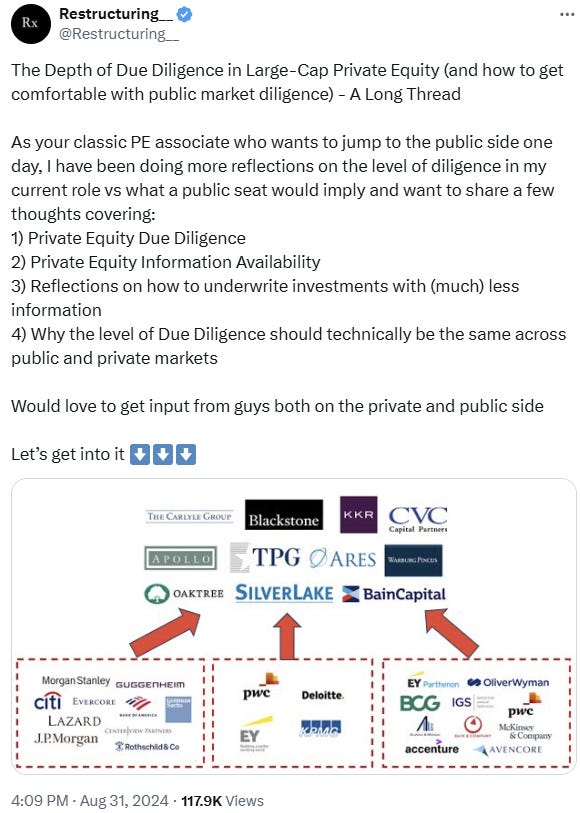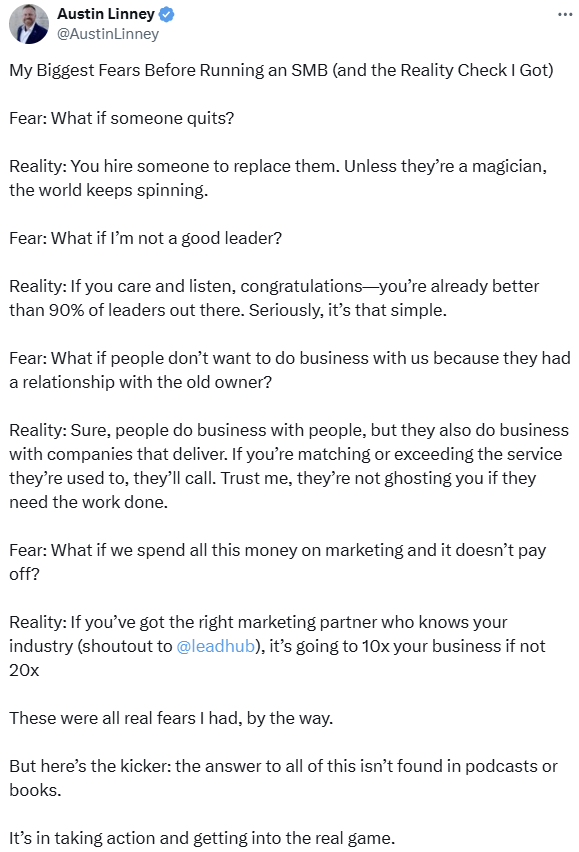What I Learned Last Week 9.6.2024
Curating the best M&A, SMB, and EtA-related content since 2020.
Hello Friends!
Quick PSA: I realize the Tuesday deal flow updates have been a bit inconsistent lately. I've been focusing on DueDilio, which has required most of my attention. I'm working on getting things back on track and hope to return to a more consistent schedule in the coming weeks.
In this week’s issue of What I Learned Last Week:
📰 Articles
🧵 Best of X (Twitter)
🤔 Other - Valuation of Equipment Heavy Business, Best SMB to Acquire, Small Business Myth
🗓️ Events
⚒️ Tools & Resources
💡 How I Can Help
This issue of The Business Inquirer is sponsored by:
Close Your Deal Quickly and Efficiently: M&A Legal Solutions Integrating Automation and Project Management
At Sterrett Law, we’ve developed a streamlined process using cutting-edge automation and project management techniques to maximize speed and efficiency. Using templates and a client-centered collaborative process we’ll keep your deal on track and on time.
Ready to make your next move? Schedule your free consultation today!
📰 Articles
I summarize, so you capitalize.
M&A Fees - What Is It, Benefits, and Strategies Included
M&A fees are payments made to experts who facilitate business sale transactions, including investment bankers, attorneys, and accountants. These fees typically range from 1% to 5% of the deal's value, with variations depending on deal complexity, business size, and the services required. Common fee types include retainers, success fees, and breakage fees, each serving a specific function in the sale process. Properly negotiating and managing these fees is crucial to avoid overpayment and ensure a profitable transaction.
Key insights include:
Retainers cover initial costs and show commitment.
Success fees are paid upon deal closure, often based on a tiered percentage.
Breakage fees apply when a transaction falls through.
Negotiating fees upfront and staying involved in the process helps avoid unexpected costs.
Working with advisors ensures confidentiality and maximizes financial outcomes by structuring the deal and minimizing tax liabilities.
— — — — — — — — — — — —
Why Pay Thousands for Quality of Earnings?
The article explores how AI tools, such as ChatGPT, can be used as cost-effective alternatives to traditional Quality of Earnings (QoE) reports when analyzing small businesses for acquisition. Instead of paying high fees to financial analysts, AI-driven solutions can analyze financial statements, identifying trends and potential risks. The author demonstrates this by evaluating the financials of a nanocap company and showing how AI can offer valuable insights, especially for smaller deals.
Key insights include:
AI can perform detailed financial statement analysis for a fraction of the cost of professional QoE reports.
Key financial trends such as declining revenue, operating losses, and changes in liabilities can be effectively highlighted by AI.
AI identifies one-time expenses and non-cash adjustments, offering a clearer view of a company's financial health.
The growing role of AI in financial analysis challenges traditional methods, especially for smaller businesses.
This use of AI can significantly cut costs for entrepreneurs, offering rapid insights into financial health without the hefty price tag.
— — — — — — — — — — — —
Will Interest Rate Cuts Affect Online Business Acquisitions?
The article discusses how upcoming interest rate cuts might affect online business acquisitions. As the Federal Reserve is expected to reduce rates, this could lower borrowing costs, making capital more available and pushing acquisition multiples higher. While a small rate cut may not immediately impact prices, the overall shift in monetary policy signals a potential increase in demand for online businesses.
Key insights include:
Interest rate increases in 2022-2023 lowered acquisition multiples as capital became more expensive and less available.
Current opportunities exist to buy businesses at lower valuations, as multiples dropped from 4.5x to 3x on average.
Rate cuts could drive competition for deals, pushing acquisition prices higher by 2025, making now a good time for buyers to enter the market.
While sellers may get better multiples in the future, they should balance that against the potential challenges of running a business for another year.
Ultimately, this period presents favorable conditions for buyers, with an expectation of rising business values as interest rates fall and economic conditions improve.
🧵 Best of X (Twitter)
I scroll, so you don’t have to.
Revenue recognition, cash flow, and proper accounting policies can make or break an SMB deal — here’s how a $440K EBITDA adjustment slashed $1.54M off a company's value…
DSCR calculations vary widely among SBA lenders — learn why different banks interpret deal factors like taxes, add-backs, and seller's notes in their own unique ways…
Private equity relies on extensive due diligence, but mastering public markets means getting comfortable with far less information — here's how the approach differs between the two…
It’s normal to have fears before running an SMB. In reality, there are many ways to overcome them…
🤔 Other
Valuation of a Business with Significant Equipment
In this Reddit discussion, a user seeks advice on valuing a heavy machinery rental business with significant equipment. They propose a $31.5M enterprise value (EV) based on a 6x multiple of $5.25M in free cash flow (FCF), but the fair market value (FMV) of the equipment is $42M, with $22.5M in debt. They feel the equity value seems low and wonder how to factor in the equipment.
Key points from the discussion:
Redundant Equipment: One user suggests determining if all the equipment is necessary for generating FCF. If some is redundant, it can be stripped out.
CapEx Consideration: Properly account for maintenance capital expenditures, as this impacts the valuation of a capital-intensive business.
Asset-Based Valuation: Some suggest using an adjusted net asset value approach, valuing the company based on equipment FMV minus debt, rather than focusing solely on FCF multiples.
Double Counting Concern: Combining asset and cash flow valuations can lead to overvaluing, as equipment already contributes to generating FCF.
Debt Treatment: Some advise ignoring equipment-related debt in the EV calculation.
In general, the consensus is to cross-check FCF-based valuations with asset values, but avoid mixing methodologies directly.
— — — — — — — — — — — —
Best Small Businesses to Acquire
In this Reddit discussion, the original poster (OP) seeks advice on purchasing and running a small business with $500,000 to invest. They are looking for suggestions on business types to seek out or avoid.
Key insights from the discussion:
Popular business types: Users recommend service-based businesses like cleaning, landscaping, or HVAC, as they often have steady cash flow, lower upfront costs, and minimal regulatory hurdles. Other suggestions include laundromats, vending machines, and niche e-commerce.
Blue-collar opportunities: Businesses in sectors like plumbing, electrical work, and roofing are also noted as attractive options for licensed buyers.
Financing strategies: Several commenters mention leveraging SBA loans to acquire businesses in the $1M-$5M range, which would enable a buyer to cover costs, earn a salary, and service the debt.
Franchises: Some users suggest franchise opportunities due to the built-in support system, while others advise caution due to potential high fees and limited autonomy.
Avoiding pitfalls: Retail businesses are generally discouraged due to high operating costs and competitive pressure from e-commerce.
Risk management: Users emphasize the importance of having a safety net, like holding back part of the capital or using seller financing to mitigate risks.
Overall, the consensus is to focus on businesses with reliable cash flow and manageable complexity while carefully considering financing options and personal experience.
— — — — — — — — — — — —
Turning $100k into $4M in ten years. Small business myth?
This Reddit discussion revolves around the viability of growing a small business acquisition from $1M to $4M over ten years, based on the book Buy Then Build by Walker Deibel. The OP is curious about the realism of achieving 10% annual growth and which business niches might fit this profile.
Key takeaways from the discussion:
Challenges of consistent growth: Many users emphasize that while 10% growth is theoretically possible, external factors like economic downturns (e.g., COVID-19) can disrupt even the best-planned businesses. Growth often depends on industry conditions and market dynamics.
Industry matters: Several commenters stress that industry plays a crucial role in determining growth potential. For example, a well-established HVAC or service business with stable demand is more likely to grow steadily than a riskier venture like e-commerce or retail.
Risks and operational challenges: Growing a business requires not just initial investment but also operational skill, the ability to scale, and sound management practices. Some users highlight that many small businesses are mismanaged, offering opportunities for improvement.
Financing and SBA loans: Opinions differ on the feasibility of using a 90% SBA loan for acquisitions, with some stating it is common while others mention significant hurdles, such as needing two years of operation under the new owner to qualify.
Experience matters: Industry-specific experience can be critical to success. Business owners and lenders may prefer or require experience in the industry before selling or financing, though this varies by business type.
In summary, while achieving a 10% annual growth rate is possible, it depends heavily on factors such as industry, operational execution, and market conditions.
🗓️ Events
Southeast EtA Conference (Sept 6-7) - Washington D.C.
Independent Sponsor Forum (Sept 12) - Chicago, IL
Self-Funded Search Conference (Sept 14-15) - Dallas, TX
Main Street Summit (Oct 9-10) - Columbia, MO
Annual M&A Institute (Oct 10-11) - Dallas, TX
Rice EtA Conference (Oct 13-14) - Houston, TX
McGuireWoods Independent Sponsor (Oct 15-16) - Dallas, TX
Texas & The South M&A and Business Symposium (Oct 16-18) - Dallas, TX
National Summit for Middle Market Funds (Oct 27-29) - Palm Beach, FL
Booth-Kellogg EtA Conference (Nov 4) - Chicago, IL
HoldCo Conference (Mar 31-Apr 3 2025) - Sundance, UT
🎵 Listening: “Turn Back Time“ by Diplo, Sonny Fodera 🎵
How did you like this issue of the newsletter?
⚒️Tools & Resources
I want to share some tools & resources that I have found helpful. Please note that some of these are paid sponsors or affiliates of the newsletter.
PrivSource - PrivSource helps you source deals and connect with transaction partners without ever paying a success fee.
X5 Deals - Proprietary deal sourcing for a great price. They do the outreach and send you relevant, actionable deals directly into your inbox.
Rejigg - Platform that connects searchers/investors directly with owners of off-market small businesses ($200k - $3M EBITDA) considering exits. All deals are sourced by the Rejigg team. Their team adds 15 to 20 new deals each week.
Kumo - 100,000+ deals sourced from thousands of brokers and marketplaces. Plus, AI-powered listings, robust data & analytics, and more.
DealFlowXchange - The premier private capital funding community for raising and deploying capital. Use discount code DUEDILIO for 20% off your lifetime membership.
Sterrett Law - At Sterrett Law, we offer Manhattan and Boston experience at Vermont prices. Specializing in deals under $10 million, we're your go-to partner for navigating the complexities of mergers and acquisitions without the hefty price tag
BizNexus - Marketplace + off-market origination in one platform. The marketplace averages about 10k active listings & pre-CIM opportunities, and the off-market origination focuses on data & multi-channel.
Secret - Say goodbye to overspending on SaaS. With Secret, you get access to up to $1,000,000+ in savings on the best software to run your search, operate, and scale your business.
Deal Sourcing Guide - a comprehensive list of business marketplaces, brokers, deal origination firms, and more.
💡 How I Can Help
Whenever you’re ready, here are a few ways for us to work together…
Schedule 1:1 consulting on deal sourcing, due diligence, M&A ecosystem, newsletters, entrepreneurship, or anything else you’d like to discuss
Promote your brand to business buyers, investors, SMB owners, and other M&A participants by sponsoring this newsletter
Assemble your M&A deal team with DueDilio
If you enjoyed reading this newsletter, why not share it?









